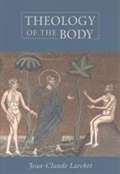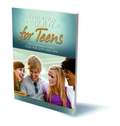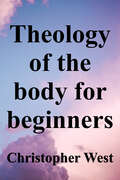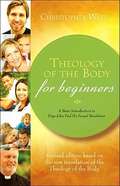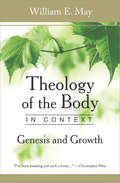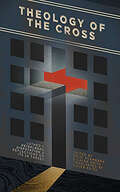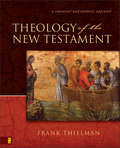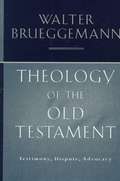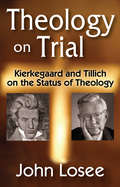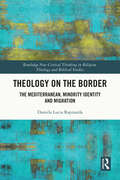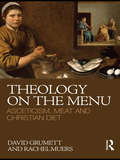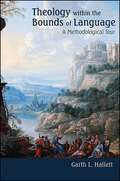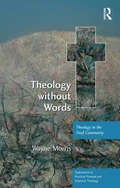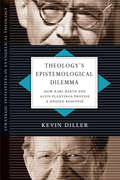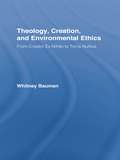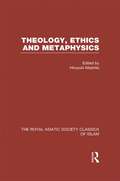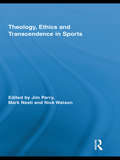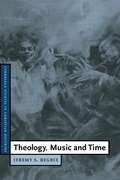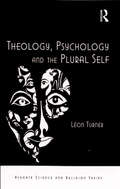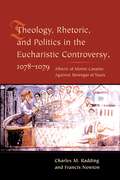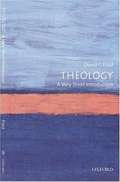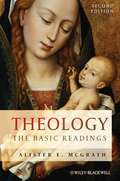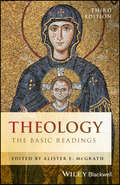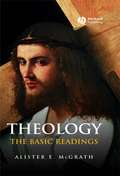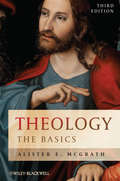- Table View
- List View
Theology of the Body
by Jean-Claude LarchetLarchet traces the contours of this complex subject using Scripture and the Church Fathers. He situates the meaning and purpose of our bodies in the cosmic drama of salvation, without losing sight of the everyday activities that use and honor—or dishonor—the human body.
Theology of the Body For Teens: Discovering God's Plan for Love and Life,Middle School Edition
by Jason Evert Brian Butler Colin Maciver Aimee MaciverThis book is meant for teens and talks about life, love and emotions. It includes lesson objectives, exercises, answer key etc.
Theology of the Body for Beginners: Rediscovering the Meaning of Life, Love, Sex, and Gender
by Christopher WestDivorce. Broken families. Sexual abuse. Addiction. Pornography. Same-sex "marriage." Gender issues. Everywhere we look, we find more and more confusion about the most fundamental truths of human life. As we lose our basic understanding of the meanings of man, woman, marriage, and sex, the question becomes ever more urgent: What does it mean to be a human being? Against this backdrop, St. John Paul II's Theology of the Body appears as a bright light in the darkness. His writings go straight to the heart of what it means to be fully human--but they are often difficult for most of us to grasp easily.
Theology of the Body for beginners: A Basic Introduction to Blessed John Paul II's Sexual Revolution
by Christopher WestBroken families, abortion, AIDS, Internet pornography, sexual abuse scandals, homosexual marriage, our Church and our world are in the midst of a profound sexual crisis. Is there a way out? For such a time as this have we been given Pope John Paul IIs Theology of the Body. Based on the words of Jesus, John Paul II's famous reflections on the body and sex take us to the root of the modern crisis and chart the path to an authentic sexual liberation. Yet the Pope's dense scholarship often intimidates the average person. In his book, Theology of the Body Explained, Christopher West offered a more detailed, six-hundred page commentary on John Paul II's Theology of the Body. Here, he provides a short and popular summary of the Pope's revolutionary teaching. What is the meaning of life? Why did God create us male and female? Why is there evil in the world and how do we overcome it? How do we attain true happiness on earth? What kind of joys await us in heaven? How can we experience the love we long for in the depth of our hearts? The first edition of Theology of the Body for Beginners (2004) quickly became an international best-seller. This freshly revised and expanded edition is based on Dr. Michael Waldsteins' much improved translation of John Paul IIs catechesis. New for this edition: All quotations have been updated with the new translation. Key insights discovered through Dr. Waldstein's access to the John Paul II archives have been incorporated. The outline of the text has been substantially reorganized to reflect the newly discovered outline of John Paul's original manuscript. John Paul's hidden and previously untranslated addresses are summarized.
Theology of the Body in Context
by William E. MayThe zenith of John Paul II's thought on the human person, marriage, and the family is found in his "theology of the body." For the first time, William E. May provides a comprehensive yet readable overview of this work in the context of several other key writings of Karol Wojtyla/John Paul II, providing rich insights into the development of the theology of the body.
Theology of the Cross: Luther's Heidelberg Disputation & Reflections on Its 28 Theses
by Chad Bird Caleb Keith Kelsi Klembara Cindy Koch Steven D Paulson Daniel Van VoorhisThe Theology of the Cross is one of the core elements of Martin Luther's theology. The development of this doctrine through the Heidelberg Disputation has been considered an essential element of Luther's breakthrough on justification, and crucial to his theological reforms and future split with the Roman Catholic Church. These statements by Luther, originally penned to be defended in debate, are counter-intuitive, contrary, offensive, and thrilling paradoxes, starting with the first and most astounding of them all: "The Law of God, the most salutary doctrine of life cannot advance humans on their way to righteousness, but rather hinders them." We hope the collection of interpretations that follow the theses in this book will help you to understand their impact.
Theology of the New Testament
by Frank S. ThielmanStudying the theology of the New Testament can be a daunting task, even to the knowledgeable Bible student or pastor. Each of the twenty-seven books, written by various authors, has its own theological emphasis and nuances. How do we elicit a coherent message from such theological diversity, especially given that some of the theological statements in the New Testament seem to be at odds with one another? Is such an endeavor achievable or even valid? Theology of the New Testament takes a balanced approach in response to these challenges. Frank Thielman presents a theology of the New Testament that is careful to take into account the cultural and historical circumstances surrounding each book and the New Testament as a whole. He not only examines each book’s theological content individually, but also in relation to the rest of the New Testament, particularly within each of the three theological units that comprise the New Testament: the gospels and Acts, the Pauline epistles, and the general epistles and Revelation. This canonical and synthetic approach honors both the theological diversity of the various books and the theological connections between the books. In the end, Thielman finds a unified theological vision of the New Testament, anchored in the centrality of Jesus Christ. Frank Thielman’s Theology of the New Testament is an outstanding achievement. The book is marked by scholarly depth, exegetical rigor, and theological profundity. Both students and professors will profit immensely from this lucid treatment of the theology contained in the New Testament documents. Thomas R. Schreiner Professor of New Testament, The Southern Baptist Theological Seminary An accessible presentation of the key theological points of the New Testament books by an accomplished New Testament scholar and teacher. Its clear style, lucid organization, and sound theological insight make it a prime resource for serious students in both the academy and the church. Karen H. Jobes, PhD Associate Professor of New Testament, Westmont College
Theology of the Old Testament: Testimony, Dispute, Advocacy
by Walter BrueggemannBrueggemann focuses on the metaphor and imagery of the courtroom trial in order to regard the theological substance of the Old Testament as a series of claims asserted for Yahweh, the God of Israel. This provides a context that attends to pluralism in every dimension of the interpretive process and suggests links to the plurality of voices of our time.
Theology on Trial: Kierkegaard and Tillich on the Status of Theology
by John LoseeSoren Kierkegaard sought to clarify what it means to be a Christian. He concluded that a one-on-one relationship with God is required, to encounter the "Absolute Paradox," defined as an immutable being entering into and transforming human history. Kierkegaard's dim view of a systematic Christian theology includes a preoccupation with theological exposition that distracts from the essential task of achieving a personal relationship with Jesus Christ. Alternatively, Paul Tillich's theology is based on a triadic relationship of being, nonbeing and Being-Itself (God), a doctrine of symbols, and a reinterpretation of the Incarnation. It correlates a culture's questions and concerns with the Christian message to certain criteria of acceptability that, to Tillich, must satisfy the "Protestant Principle," stipulating that a theological system both restates the present-time Christian message and acknowledges that this restatement cannot be the definitive, ultimate expression of that message. Theology on Trial presents and assesses whether, and to what degree, Tillich's theology satisfies his own criteria of acceptability. An acceptable theology must be logically consistent and free of equivocation. The concluding section of the book examines the views of each author from the standpoint of the other.
Theology on the Border: The Mediterranean, Minority Identity, and Migration (Routledge New Critical Thinking in Religion, Theology and Biblical Studies)
by Daniela Lucia RapisardaFocusing on the Mediterranean, this book offers a theological hermeneutics from the perspective of the margin/border and a theological hermeneutics of the border. At the core is a case study of the Italian Protestant minority and its engagement with issues of migration. While much of current migration theology is built around the principle of sacralization of the migrant person or 'vertical' association between divinity (God or Jesus) and people on the move, this work offers a 'horizontal' perspective on humanization or recognition of the value of every human being, based on the principle of a shared humanity created in God’s image, and a sense of identification, first by people at the margins. This approach seeks to avoid essentializing migrantness and victimhood. Elaborations on the relation between identity and migration are often sustained by exclusionary logics that lead to repressive policies. The book proposes a contextual theological reflection on minority identity that is at its core inclusive. It offers a contribution to theology beyond confessional borders and is open to dialogue with other disciplines, particularly critical border studies.
Theology on the Menu: Asceticism, Meat and Christian Diet
by Rachel Muers David GrumettFood - what we eat, how much we eat, how it is produced and prepared, and its cultural and ecological significance- is an increasingly significant topic not only for scholars but for all of us. Theology on the Menu is the first systematic and historical assessment of Christian attitudes to food and its role in shaping Christian identity. David Grumett and Rachel Muers unfold a fascinating history of feasting and fasting, food regulations and resistance to regulation, the symbolism attached to particular foods, the relationship between diet and doctrine, and how food has shaped inter-religious encounters. Everyone interested in Christian approaches to food and diet or seeking to understand how theology can engage fruitfully with everyday life will find this book a stimulus and an inspiration.
Theology within the Bounds of Language: A Methodological Tour
by Garth L. HallettIn this wide-ranging work, Garth L. Hallett offers a guided tour through fundamental issues regarding the use of language in theology. His preliminary discussions—on language and thought, language and truth, the authority of language, making sense, the relationship between sense and possibility—prepare linguistic reflection on such topics as inference and argument, universal factual and moral claims, defining and saying what things are, verbal versus nonverbal agreement and disagreement, interfaith dialogue, theological language, and metaphor. Hallett employs a wealth of distinctly Christian examples in these considerations, including love, faith, God, religion, the Eucharist, the afterlife, divine law, evil, the Incarnation, the Trinity, the holy, and many others. In the course of this fascinating exploration, readers should learn to find their way more surely in a vast, complex terrain, and mystery will emerge both diminished and deepened. In addition, at the end of each chapter Hallett provides a series of intriguing quotations that invite further reflection.
Theology without Words: Theology in the Deaf Community (Explorations in Practical, Pastoral and Empirical Theology)
by Wayne MorrisThis book is a study of a Christian theology without words, focussing on theology in the Deaf Community. Deaf people's first and preferred method of communication is not English or any other spoken language, but British Sign Language - a language that cannot be written down. Deaf people of faith attend church on a regular basis, profess faith in God and have developed unique approaches to doing theology. While most Western theology is word-centred and is either expressed through or dependent on written texts, theology in the Deaf Community is largely non-written. This book presents and examines some of that theology from the Deaf Community and argues that written texts are not necessary for creative theological debate, a deep spirituality or for ideas about God to develop.
Theology's Epistemological Dilemma: How Karl Barth and Alvin Plantinga Provide a Unified Response (Strategic Initiatives in Evangelical Theology)
by Kevin DillertruthTheology's Epistemological Dilemma
Theology, Creation, and Environmental Ethics: From Creatio Ex Nihilo to Terra Nullius (Routledge Studies in Religion)
by Whitney BaumanWinner of the John Templeton Award for Theological Promise, 2009 This book argues that the Christian doctrine of creatio ex nihilo (creation out of nothing) sets up a support system for a "logic of domination" toward human and earth others. Conceptually inspired by the work of theologian Catherine Keller and feminist philosopher of the environment Val Plumwood, it follows a genealogical method in examining how the concept of creation out of nothing materializes in the world throughout different periods in the history of the Christian West.
Theology, Ethics and Metaphysics: Royal Asiatic Society Classics of Islam (Royal Asiatic Society Books)
by C. Edmund Bosworth Hiroyuki MashitaThis collection of classic works, originally published under the auspices of the Royal Asiatic Society, includes an introduction by Professor Edmund Bosworth, and a preface by Professor Anthony Stockwell. Primary texts include works by F. Rosen, W.F. Thompson, C.E. Sachau, R.A. Nicholson, W.H.T. Gairdner, W.M. Miller and J. Robson, spanning over 100 years of oriental scholarship.
Theology, Ethics and Transcendence in Sports (Routledge Research in Sport, Culture and Society)
by Jim ParryThis book provides an inter-disciplinary examination of the relationship between sport, spirituality and religion. It covers a wide-range of topics, such as prayer and sport, religious and spiritual perspectives on athletic identity and ‘flow’ in sport, theological analysis of genetic performance enhancement technologies, sectarianism in Scottish football, a spiritual understanding of sport psychology consultancy in English premiership soccer and how Zen may be useful in sports performance and participation. As modern sport is often intertwined with commercial and political agendas, this book also provides an important corrective to the “win at all costs” culture of modern sport, which cannot always be fully understood through secular ethical inquiry. This is a unique and important addition to the current literature for a wide-range of fields including theology and religious studies, psychology, health studies, ethics and sports studies.
Theology, Music and Time (Cambridge Studies In Christian Doctrine Series #4)
by Jeremy S. BegbieTheology, Music and Time aims to show how music can enrich and advance theology, extending our wisdom about God and God's ways with the world. Instead of asking: what can theology do for music?, it asks: what can music do for theology? Jeremy Begbie argues that music's engagement with time gives the theologian invaluable resources for understanding how it is that God enables us to live 'peaceably' with time as a dimension of the created world. Without assuming any specialist knowledge of music, he explores a wide range of musical phenomena--rhythm, metre, resolution, repetition, improvisation--and through them opens up some of the central themes of the Christian faith -creation, salvation, eschatology, time and eternity, eucharist, election and ecclesiology. In so doing, he shows that music can not only refresh theology with new models, but also release it from damaging habits of thought which have hampered its work in the past.
Theology, Psychology and the Plural Self (Routledge Science and Religion Series)
by Léon TurnerIs the human self singular and unified or essentially plural? This book explores the seemingly disparate ways that Christian theology and the secular human sciences have approached this complex question. The latter have largely embraced the idea of the plural self as an inescapable, even adaptive feature of psychological life. Contemporary Christian theology, by contrast, has largely neglected recent psychological accounts of the naturalness of self-plurality, and has sought to reaffirm the self's unity in opposition to those postmodern theorists who would dismantle it. Through an original analysis of recent theological and secular accounts of self and personhood, this book examines the extent of the intertheoretical disparity and its broader implications for theology's dialogue with the human sciences in general, and psychology in particular. It explains why theologians ought to take questions about the plurality of self very seriously, and how they overlap with many of the central concerns of contemporary theological anthropology, including the notions of relationality, particularity and human sinfulness. Introducing a novel psychological framework to distinguish various understandings of self-disunity, the author argues that contemporary theology's blanket condemnation of self-multiplicity is misconceived, and identifies a possible means of reconciling theological and human scientific accounts.
Theology, Rhetoric, and Politics in the Eucharistic Controversy, 1078-1079: Alberic of Monte Cassino Against Berengar of Tours
by Francis Newton Charles RaddingIn the concluding stages of the eleventh-century Eucharistic Controversy, which turned on whether, and how, sacramental consecration changed the nature of bread and wine at the altar, Alberic of Monte Cassino composed a small but important treatise. Alberic was the most renowned teacher of rhetoric in his time, and his treatise, buttressed by appeal to the authority of the Church Fathers, was said by contemporaries to have "utterly destroyed" the argument of his opponent, Berengar of Tours, that the bread and wine survived its consecration. Modern scholars had long believed Alberic's treatise to be lost. This book demonstrates that this crucial document, far from being lost, is an existing identifiable text. By showing conclusively that this work was written by Alberic, Radding and Newton transform our understanding not only of the particulars of the controversy and papal politics but also of the intellectual process by which theological doctrines took shape in mediaeval Church councils. The book includes the full Latin text and the first translation of Alberic's treatise.
Theology: A Very Short Introduction
by David F. FordThis Very Short Introduction provides both believers and non-believers with a balanced survey of the central questions of contemporary theology. David Ford's interrogative approach draws the reader into considering the principles underlying religious belief, including the centrality of salvation to most major religions, the concept of God in ancient, modern, and postmodern contexts, the challenge posed to theology by prayer and worship, and the issue of sin and evil. He also proves the nature of experience, knowledge, and wisdom in theology, and discusses what is involved in interpreting theological texts today.
Theology: The Basic Readings (Second Edition)
by Alister E. McGrathReadings are drawn from a broad theological spectrum and includes both historical and contemporary, mainstream and cutting–edge approaches Provides an introduction and analysis of each reading, along with a helpful glossary Uses the Apostle′s Creed as a framework to introduce readers to writings on key issues, such as faith, God, Jesus, creation, and salvation.
Theology: The Basic Readings (Coursesmart Ser.)
by Alister E. McGrathThis highly successful and popular book is now available in a thoroughly expanded and updated new edition. Alister E. McGrath, one of the world’s leading theologians, provides readers with a concise and balanced introduction to Christianity as it has been interpreted by many of its greatest thinkers and commentators, from its beginning to the modern day. Theology: The Basic Readings, 3rd Edition comprises sixty-eight readings spanning twenty centuries of Christian history. To help readers engage with the material, each reading is accompanied by an introduction, comments, study questions, and a helpful glossary of terms used by its author. Readings are drawn from a broad theological spectrum and include both historical and contemporary, mainstream, and cutting-edge approaches Uses the Apostles’ Creed as a framework to introduce readers to writings on key issues, such as faith, God, Jesus, creation, and salvation Represents two thousand years of sustained critical reflection within western Christianity Encourages readers to interact with each text and to engage with primary sources Serves as an ideal companion to the bestselling, Theology: The Basics or as a standalone text Theology: The Basic Readings, 3rd Edition is an essential guide to the topics, themes, controversies, and reflections on Christianity as they have been understood by many of its greatest commentators.
Theology: The Basic Readings (Coursesmart Ser.)
by Alister E. McGrathThis short, balanced and accessible Reader introduces the Christian faith through important theological readings, covering historical, modern, denominational, gender, liberal and traditional issues. It is the ideal accompaniment to the bestselling textbook, Theology: The Basics, 2nd edition. Edited by leading theologian, Alister E. McGrath, this volume brings together a range of readings which act as an introduction to the Christian faith Includes 56 readings chosen for their balanced portrayal of chronology, denomination, gender, and theological orientation Provides an introduction and analysis of each reading, along with a helpful glossary Uses the Apostle’s Creed as an accessible framework to introduce readers to writings on key issues, such as faith, God, Jesus, creation and salvation Encourages readers to interact with each text and to engage with primary sources.
Theology: The Basic Readings Third Edition
by Alister E. McgrathThe second edition of this book, written by internationally-acclaimed theologian and author Alister E. McGrath, has been completely updated in response to feedback from readers. It retains the clarity and accessibility that made the first edition so popular, whilst expanding its coverage of a range of issues.Includes a major new chapter on sacraments and new sections on core topics, including the problem of suffering, the theology of sin, concepts of heaven, and views of the millennium. Uses the Apostle's Creed as a framework to introduce readers to key theological issues, such as God, Jesus Christ, the Holy Spirit, faith, creation, salvation, atonement, religious history and heaven. Contains within each chapter an overview of one of these themes, presents relevant biblical passages, and summarizes the contribution of one major theologian. Written by one of the world's leading theologians for anyone taking a first short course in Christian theology. Can be used alongside McGrath's Theology: The Basic Readings for a complete overview of the field.
